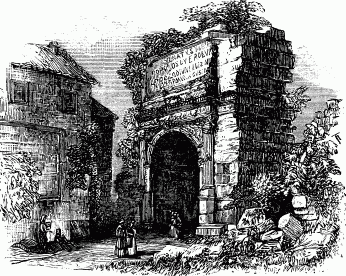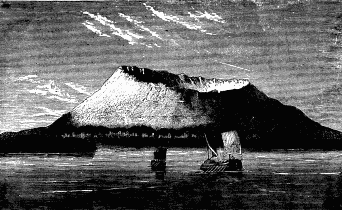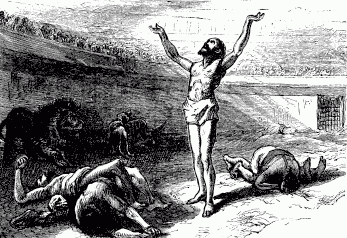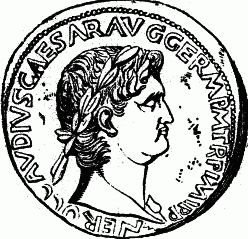
The ablest of all Nero's officers was Titus Flavius Vespasianus, a stern, rigid old soldier, who, with his son of the same name, was in the East, preparing to put down a great rising of the Jews. He waited to see what was going to happen, and in a very few weeks old Galba had offended the soldiers by his saving ways; there was a rising against him, and another soldier named Otho became Emperor; but the legions from Gaul marched up under Vitellius to dethrone him, and he killed himself to prevent other bloodshed.
When the Eastern army heard of these changes, they declared they would make an Emperor like the soldiers of the West, and hailed Vespasian as Emperor. He left his son Titus to subdue Judea, and set out himself for Italy, where Vitellius had given himself up to riot and feasting. There was a terrible fight and fire in the streets of Rome itself, and the Gauls, who chiefly made up Vitellius' army, did even more mischief than the Gauls of old under Brennus; but at last Vespasian triumphed. Vitellius was taken, and, after being goaded along with the point of a lance, was put to death. There had been eighteen months of confusion, and Vespasian began his reign in the year 70.
It was just then that his son Titus, having taken all the strongholds in Galilee, though they were desperately defended by the Jews, had advanced to besiege Jerusalem. All the Christians had heeded the warning that our blessed Lord had left them, and were safe at a city in the hills called Pella; but the Jews who were left within were fiercely quarrelling among themselves, and fought with one another as savagely as they fought with the enemy. Titus threw trenches round and blockaded the city; and the famine within grew to be most horrible. Some died in their houses, but the fierce lawless zealots rushed up and down the streets, breaking into the houses where they thought food was to be found. When they smelt roasting in one grand dwelling belonging to a lady, they rushed in and asked for the meat, but even they turned away in horror when she uncovered the remains of her own little child, whom she had been eating. At last the Roman engines broke down the walls of the lower city, and with desperate struggling the Romans entered, and found every house full of dead women and children. Still they had the Temple to take, and the Jews had gathered there, fancying that, at the worst, the Messiah would appear and save them. Alas! they had rejected Him long ago, and this was the time of judgment. The Romans fought their way in, up the marble steps, slippery with blood and choked with dead bodies; and fire raged round them. Titus would have saved the Holy Place as a wonder of the world, but a soldier threw a torch through a golden latticed window, and the flame spread rapidly. Titus had just time to look round on all the rich gilding and marbles before it sank into ruins. He took a terrible vengeance on the Jews. Great numbers were crucified, and the rest were either taken to the amphitheatres all over the empire to fight with wild beasts, or were sold as slaves, in such numbers that, cheap as they were, no one would buy them. And yet this wonderful nation has lived on in its dispersion ever since. The city was utterly overthrown and sown with salt, and such treasures as could be saved from the fire were carried in the triumph of Titus—namely, the shew-bread table, the seven-branched candlestick, and the silver trumpets—and laid up as usual among the spoils dedicated to Jupiter. Their figures are to be seen sculptured on the triumphal arch built in honor of Titus, which still stands at Rome.

These Flavian Cæsars were great builders. Much had to be restored at Rome after the two great fires, and they built a new Capitol and new Forum, besides pulling down Nero's Golden House, and setting up on part of the site the magnificent baths known as the Baths of Titus. Going to the bath, to be steamed, rubbed, anointed, and perfumed by the slaves, was the great amusement of an idle Roman's day, for in the waiting-rooms he met all his friends and heard the news; and these rooms were splendid halls, inlaid with marble, and adorned with the statues and pictures Nero had brought from Greece. On part of the gardens was begun what was then called the Flavian Amphitheatre, but is now known as the Colosseum, from the colossal statue that stood at its door—a wonderful place, with a succession of galleries on stone vaults round the area, on which every rank and station, from the Emperor and Vestal Virgins down to the slaves, had their places, whence to see gladiators and beasts struggle and perish, on sands mixed with scarlet grains to hide the stain, and perfumed showers to overcome the scent of blood, and under silken embroidered awnings to keep off the sun.
Vespasian was an upright man, and though he was stern and unrelenting, his reign was a great relief after the capricious tyranny of the last Claudii. He and his eldest son Titus were plain and simple in their habits, and tried to put down the horrid riot and excess that were ruining the Romans, and they were feared and loved. They had great successes too. Britain was subdued and settled as far as the northern hills, and a great rising in Eastern Gaul subdued. Vespasian was accused of being avaricious, but Nero had left the treasury in such a state that he could hardly have governed without being careful. He died in the year 79, at seventy years old. When he found himself almost gone, he desired to be lifted to his feet, saying that an Emperor should die standing.

He left two sons, Titus and Domitian. Titus was more of a scholar than his father, and was gentle and kindly in manner, so that he was much beloved. He used to say, "I have lost a day," when one went by without his finding some kind act to do. He was called the delight of mankind, and his reign would have been happy but for another great fire in Rome, which burnt what Nero's fire had left. In his time, too, Mount Vesuvius suddenly woke from its rest, and by a dreadful eruption destroyed the two cities at its foot, Herculaneum and Pompeii. The philosopher Plinius, who wrote on geography and natural history, was stifled by the sulphurous air while fleeing from the showers of stones and ashes cast up by the mountain. His nephew, called Pliny the younger, has left a full account of the disaster, and the cloud like a pine tree that hung over the mountain, the noises, the earthquake, and the fall at last of the ashes and lava. Drusilla, the wife of Felix, the governor before whom St. Paul pleaded, also perished. Herculaneum was covered with solid lava, so that very little could be recovered from it; but Pompeii, being overwhelmed with dust or ashes, was only choked, and in modern days has been discovered, showing perfectly what an old Roman town was like—amphitheatre, shops, bake-houses, and all. Some skeletons have been found: a man with his keys in a cellar full of treasure, a priest crushed by a statue of Isis, a family crowded into a vault, a sentry at his post; and in other cases the ashes perfectly moulded the impression of the figure they stifled, and on pouring plaster into them the forms of the victims have been recovered, especially two women, elder and younger, just as they fell at the gate, the girl with her head hidden in her mother's robe.

Titus died the next year, and his son-in-law Tacitus, who wrote the history of those reigns, laid the blame on his brother Domitian, who was as cruel and savage a tyrant as Nero. He does seem to have been shocked at the wickedness of the Romans. Even the Vestal Virgins had grown shameless, and there was hardly a girl of the patrician families in Rome well brought up enough to become one. The blame was laid on forsaking the old religion, and what the Romans called "Judaising," which meant Christianity, was persecuted again. Flavius Clemens, a cousin of the Emperor, was thus accused and put to death; and probably it was this which led to St. John, the last of the Apostles, being brought to Rome and placed in a cauldron of boiling oil by the Lateran Gate; but a miracle was wrought in his behalf, and the oil did him no hurt, upon which he was banished to the Isle of Patmos.
The Colosseum was opened in Domitian's time, and the shows of gladiators, fights with beasts, and even sea-fights, when the arena was flooded, exceeded all that had gone before. There were fights between women and women, dwarfs and cranes. There is an inscription at Rome which has made some believe that the architect of the Colosseum was one Gandentius, who afterwards perished there as a Christian.
Domitian affronted the Romans by wearing a gold crown with little figures of the gods on it. He did strange things. Once he called together all his council in the middle of the night on urgent business, and while they expected to hear of some foreign enemy on the borders, a monstrous turbot was brought in, and they were consulted whether it was to be cut in pieces or have a dish made on purpose for it. Another time he invited a number of guests, and they found themselves in a black marble hall, with funeral couches, each man's name graven on a column like a tomb, a feast laid as at a funeral, and black boys to wait on them! This time it was only a joke; but Domitian did put so many people to death that he grew frightened lest vengeance should fall on him, and he had his halls lined with polished marble, that he might see as in a glass if any one approached him from behind. But this did not save him. His wife found that he meant to put her to death, and contrived that a party of servants should murder him, A.D. 96.
